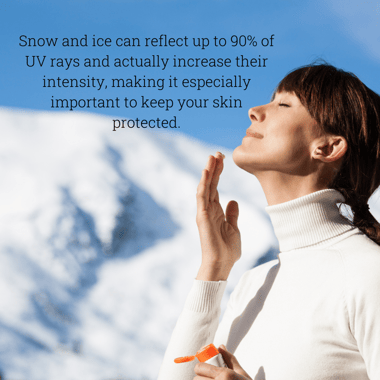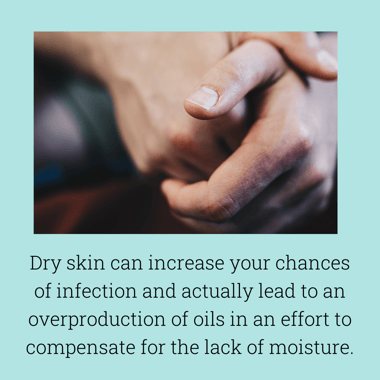Revamp your winter skin care with these 5 tips
Whether you live in a place that requires multiple clothing layers to stay warm or you're in a sunnier climate, winter can be tough on skin. Particularly in cold locations, staying indoors in artificial heat is drying, and requires a different approach. Continue reading for five ways to keep your skin looking spring-level fresh during winter.
1. Wear sunscreen
That's right, sunscreen isn't just a summer thing. Although the days are shorter and the sun feels "weaker," that doesn't mean you're protected. The sun's ultraviolet rays continue to break down cells regardless of the season, leading to premature aging, sunspots, and discoloration. Most notably, you can increase your risk of skin cancer because snow and ice can reflect rays and increase their intensity—as anyone who's gotten a sunburn on the ski slopes can tell you.
The dermatology practice suggests a broad-spectrum sunscreen that protects against both UVA and UVB rays and has at least SPF 30 protection. If you're active in winter, such as doing sports outside, you may want a higher SPF level, and to reapply more frequently.
2. Limit hot showers and baths

Particularly when the temperature drops outside, it can feel comforting to linger in a hot shower, or to take more frequent, steamy baths. But that can inflame the skin and cause itching, redness, and even peeling, according to dermatologists at the University of Pittsburgh Medical Center (UPMC).
When this happens, you may be more susceptible to infection and dry skin. Lukewarm or cooler showers, even just a few times per week, can keep skin hydrated and decrease the chance that you'll feel itchy.
Also, moisturize your body right afterward, while skin is still damp, since this helps trap the moisture in the skin. The American Academy of Dermatology Association suggests ingredients that work well for dry skin are lanolin, glycerin, mineral oil, and shea butter. Facial skin is thinner and more sensitive, the group adds, so you'll likely need a moisturizer designed just for the face but use the same tactic of moisturizing right after a shower or bath.
3. Use mild soap
Another tip from the UPMC dermatologists: Consider using less soap, and opt for mild soap when you do. In general, they note that soap is drying to skin and strips away the natural oil barrier. If soap has more chemicals—such as strong fragrances or exfoliating qualities—this can exacerbate the effect.
Try a fragrance-free, non-soap cleanser instead, UPMC suggests. You won't see as much lather as you would with regular soap, but you'll be doing your skin a favor. Moisturizing shower gel can be another option, as long as it isn't heavily scented.
4. Watch the fragrances
As noted in the soap options, scents aren't necessarily bad in skincare products, but if your skin is already dry from winter weather, fragrance can be more irritating. It's one of the top contact allergens found in skincare products, according to research in the American Journal of Clinical Dermatology, so if you're feeling extra itchy or you're experiencing a rash after using scented products, consider switching to an unscented version. Fragrance is also added to cleaning solutions, laundry soap, dryer sheets, and scented candles. So, in the winter, minimizing the multiple layers of fragrance by choosing unscented products could help improve skin health.
5. Get a dermatology check

Having an annual screening with a dermatologist can help spot any problems early, particularly with moles and growths. But a dermatologist can also offer insights on a better winter skincare regimen compared to what you do in other seasons.
For example, the American Academy of Dermatology Association recommends minimizing the use of products containing anti-aging ingredients such as glycolic acid, salicylic acid, or retinol in winter since they may be too drying. The group suggests using them less often or in lower concentrations—your dermatologist can help you find the right mix of products and strategies that support skin health through the season.
